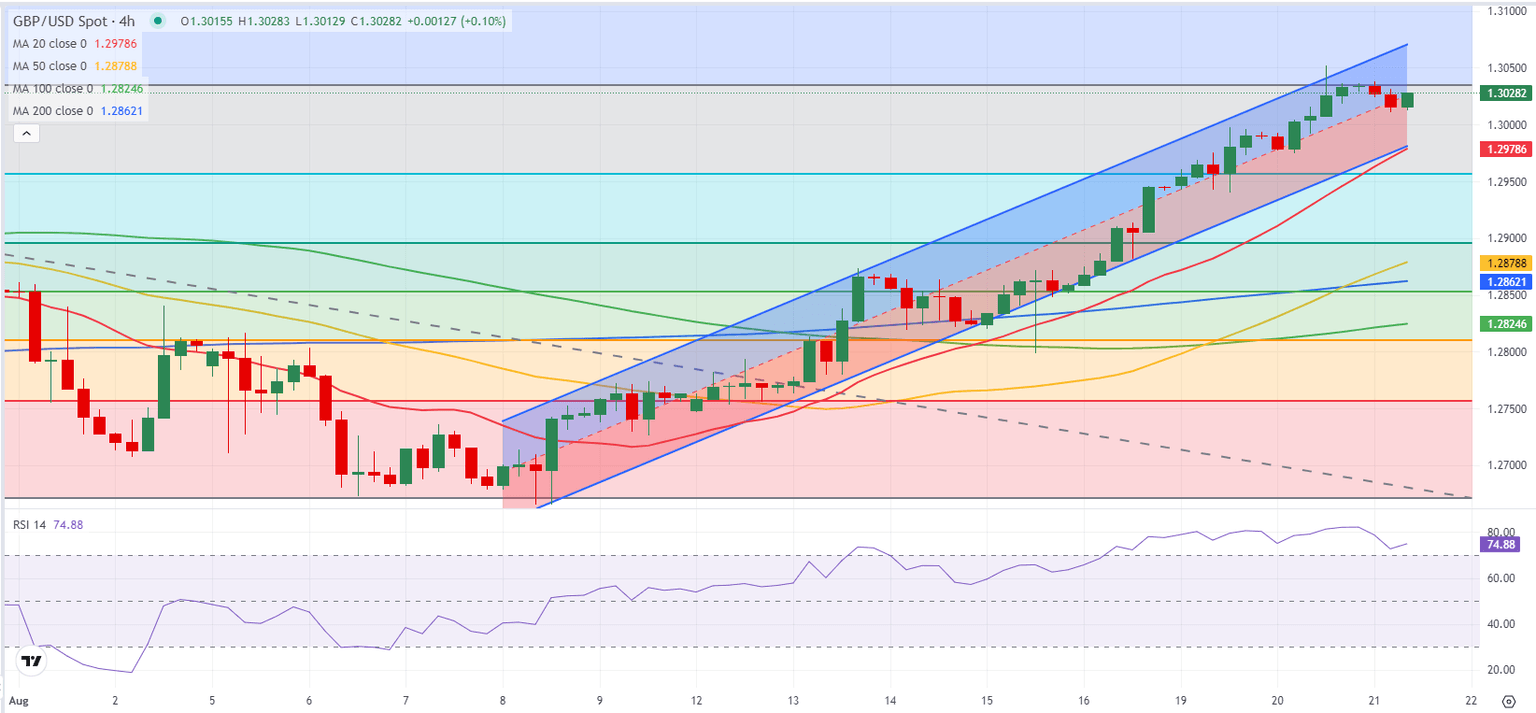GBP/USD Forecast: 1.2980 aligns as key support for Pound Sterling
- GBP/USD consolidates weekly gains, holds above 1.3000 on Wednesday.
- The US Dollar struggles to stage a decisive rebound.
- Benchmark revision to Nonfarm Payrolls and FOMC Minutes coming up later in the day.

GBP/USD preserved its bullish momentum and advanced to its highest level since July 2023 at 1.3052 on Tuesday. The pair edges slightly lower in the European session on Wednesday but stays afloat above 1.3000.
Euro PRICE This week
The table below shows the percentage change of Euro (EUR) against listed major currencies this week. Euro was the strongest against the US Dollar.
| USD | EUR | GBP | JPY | CAD | AUD | NZD | CHF | |
|---|---|---|---|---|---|---|---|---|
| USD | -0.87% | -0.64% | -1.15% | -0.57% | -1.06% | -1.57% | -1.22% | |
| EUR | 0.87% | 0.15% | -0.24% | 0.32% | -0.28% | -0.87% | -0.38% | |
| GBP | 0.64% | -0.15% | -0.55% | 0.12% | -0.44% | -0.95% | -0.53% | |
| JPY | 1.15% | 0.24% | 0.55% | 0.51% | 0.04% | -0.33% | -0.22% | |
| CAD | 0.57% | -0.32% | -0.12% | -0.51% | -0.53% | -0.93% | -0.69% | |
| AUD | 1.06% | 0.28% | 0.44% | -0.04% | 0.53% | -0.44% | -0.10% | |
| NZD | 1.57% | 0.87% | 0.95% | 0.33% | 0.93% | 0.44% | 0.38% | |
| CHF | 1.22% | 0.38% | 0.53% | 0.22% | 0.69% | 0.10% | -0.38% |
The heat map shows percentage changes of major currencies against each other. The base currency is picked from the left column, while the quote currency is picked from the top row. For example, if you pick the Euro from the left column and move along the horizontal line to the US Dollar, the percentage change displayed in the box will represent EUR (base)/USD (quote).
The persistent selling pressure surrounding the US Dollar (USD) fuelled another leg higher in GBP/USD on Tuesday. Although Wall Street's main indexes trades mixed after the opening bell, falling US Treasury bond yields forced the USD to stay on the back foot.
Early Wednesday, US stock index futures trade virtually unchanged on the day, pointing to a neutral market mood.
During the American trading hours on Wednesday, The US Bureau of Labor Statistics (BLS) will release the preliminary estimate of the annual benchmark revision to Nonfarm Payrolls in the 12 months to March. A significant downward revision could feed into uncertainty over the labor market outlook and make it difficult for the USD to find demand. On the flip side, an upward revision could trigger a rebound in the USD with the immediate reaction and cause GBP/USD to correct lower.
Later in the day, the Federal Reserve will release the minutes of the July 30-31 policy meeting. In the post-meeting press conference, Fed Chairman Jerome Powell noted that there was a "real discussion" about reducing the policy rate in July.
GBP/USD Technical Analysis
The Relative Strength Index (RSI) indicator on the 4-hour chart stays above 70, suggesting that GBP/USD remains overbought despite the pullback seen earlier in the day.
On the downside, 1.3000 (psychological level, static level) aligns as immediate support before 1.2980 (20-period Simple Moving Average (SMA), the lower limit of the ascending regression channel). A daily close below the latter could attract technical sellers and open the door for an extended correction toward 1.2900 (psychological level, static level).
In case GBP/USD clears 1.3045 (static level), it could face next resistance at 1.3070 (upper limit of the ascending channel) before targeting 1.3100 (psychological level, static level).
Euro FAQs
The Euro is the currency for the 20 European Union countries that belong to the Eurozone. It is the second most heavily traded currency in the world behind the US Dollar. In 2022, it accounted for 31% of all foreign exchange transactions, with an average daily turnover of over $2.2 trillion a day. EUR/USD is the most heavily traded currency pair in the world, accounting for an estimated 30% off all transactions, followed by EUR/JPY (4%), EUR/GBP (3%) and EUR/AUD (2%).
The European Central Bank (ECB) in Frankfurt, Germany, is the reserve bank for the Eurozone. The ECB sets interest rates and manages monetary policy. The ECB’s primary mandate is to maintain price stability, which means either controlling inflation or stimulating growth. Its primary tool is the raising or lowering of interest rates. Relatively high interest rates – or the expectation of higher rates – will usually benefit the Euro and vice versa. The ECB Governing Council makes monetary policy decisions at meetings held eight times a year. Decisions are made by heads of the Eurozone national banks and six permanent members, including the President of the ECB, Christine Lagarde.
Eurozone inflation data, measured by the Harmonized Index of Consumer Prices (HICP), is an important econometric for the Euro. If inflation rises more than expected, especially if above the ECB’s 2% target, it obliges the ECB to raise interest rates to bring it back under control. Relatively high interest rates compared to its counterparts will usually benefit the Euro, as it makes the region more attractive as a place for global investors to park their money.
Data releases gauge the health of the economy and can impact on the Euro. Indicators such as GDP, Manufacturing and Services PMIs, employment, and consumer sentiment surveys can all influence the direction of the single currency. A strong economy is good for the Euro. Not only does it attract more foreign investment but it may encourage the ECB to put up interest rates, which will directly strengthen the Euro. Otherwise, if economic data is weak, the Euro is likely to fall. Economic data for the four largest economies in the euro area (Germany, France, Italy and Spain) are especially significant, as they account for 75% of the Eurozone’s economy.
Another significant data release for the Euro is the Trade Balance. This indicator measures the difference between what a country earns from its exports and what it spends on imports over a given period. If a country produces highly sought after exports then its currency will gain in value purely from the extra demand created from foreign buyers seeking to purchase these goods. Therefore, a positive net Trade Balance strengthens a currency and vice versa for a negative balance.
Premium
You have reached your limit of 3 free articles for this month.
Start your subscription and get access to all our original articles.
Author

Eren Sengezer
FXStreet
As an economist at heart, Eren Sengezer specializes in the assessment of the short-term and long-term impacts of macroeconomic data, central bank policies and political developments on financial assets.


















